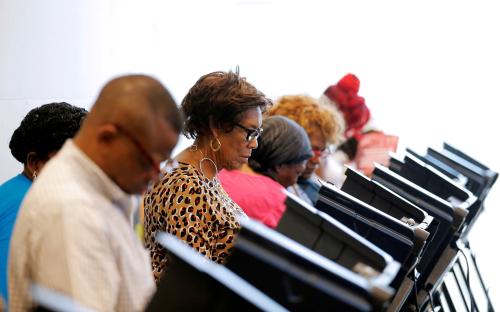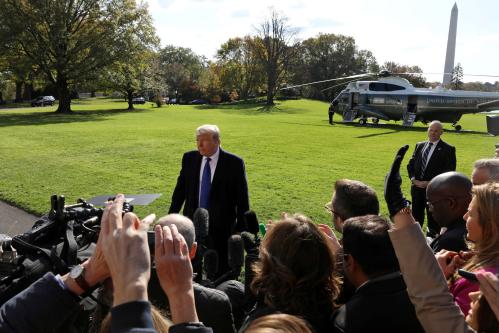By a plurality of 48 to 44%, according to the latest poll averages, Americans favor impeaching President Trump and removing him from office. But, as we know, presidential elections are made in the electoral college on a state-by-state basis and senators are elected in this manner as well, which is why it is important to look at public opinion by state.
According to a just-released New York Times/Siena College poll, sentiment in the swing states that will determine the winner of the 2020 presidential election differs from the national averages. Like other Americans, voters in these states support an impeachment inquiry. But by a margin of 52 to 44%, they oppose impeachment and removal. Supermajorities of pro-impeachment voters in coastal states may swell the national numbers, but analysts and party operatives should look elsewhere to determine the politically-relevant level of support for the Democrats’ impeachment drive.
Let’s begin with the bottom line in six key states.
TABLE 1: SUPPORT FOR IMPEACHMENT AND REMOVAL BY STATE
| Support impeachment and removal | Oppose impeachment and removal | |
| Arizona | 45 | 52 |
| Florida | 42 | 53 |
| Michigan | 42 | 51 |
| North Carolina | 43 | 53 |
| Pennsylvania | 45 | 52 |
| Wisconsin | 45 | 51 |
| Swing state average | 44 | 52 |
Now here’s the breakdown by party identification.
TABLE 2: SUPPORT FOR IMPEACHMENT AND REMOVAL BY PARTY ID
| Democrat | Republican | Independent | |
| Arizona | 75 | 5 | 43 |
| Florida | 73 | 8 | 35 |
| Michigan | 81 | 6 | 38 |
| North Carolina | 84 | 7 | 41 |
| Pennsylvania | 83 | 6 | 42 |
| Wisconsin | 88 | 6 | 43 |
The bottom line: five weeks of non-stop revelations have failed to budge near-uniform Republican opposition to impeachment and have left a majority of Independents unpersuaded.
In these swing states, moreover, remarkably few individuals who voted for Donald Trump in 2016 are turning their back on him now. The average of such voters in the swing states is just 5%, while nearly twice the share of Clinton 2016 voters—9%—oppose impeaching and removing Mr. Trump.
As expected, levels of support for the impeachment and removal effort differ sharply by race and ethnicity.
TABLE 3: SUPPORT FOR IMPEACHMENT AND REMOVAL BY RACE AND ETHNICITY
| White | African-American | Latino | |
| Arizona | 38 | 65 | 51 |
| Florida | 32 | 67 | 53 |
| Michigan | 35 | 76 | 55 |
| North Carolina | 31 | 81 | 48 |
| Pennsylvania | 37 | 88 | 68 |
| Wisconsin | 43 | * | * |
(* sample size too small for meaningful breakdown)
Notably, support for impeachment and removal is much lower among Latinos than among African Americans. This could have a significant effect on 2020 outcomes in Arizona and Florida, where Latinos make up one-fifth of the electorate, and it suggests that fiery pro-impeachment rhetoric could prove a double-edged sword in these states.
The New York Times/Siena Poll finds that 8% of the voters in these key swing states favor an inquiry but oppose impeachment and removal. It is reasonable to assume that some of these voters may change their minds in response to the evidence that the inquiry reveals and their perception of the fairness of the process.
The long decline in trust in elected officials may mute this response, however. Taking swing states as a whole, 47% of voters believe that President Trump’s actions related to Ukraine as well as to investigating former Vice President Biden and his son are “typical of what politicians do” rather than much worse than that of typical politicians (43%). The share of swing state voters taking this dark view of politics ranges from a low of 42% in Florida to a high of 51% in Arizona.
Americans’ cynicism about politicians could end up saving Mr. Trump’s presidency, at least until November of 2020.






Commentary
The states that will decide the 2020 election oppose impeaching President Trump
November 1, 2019